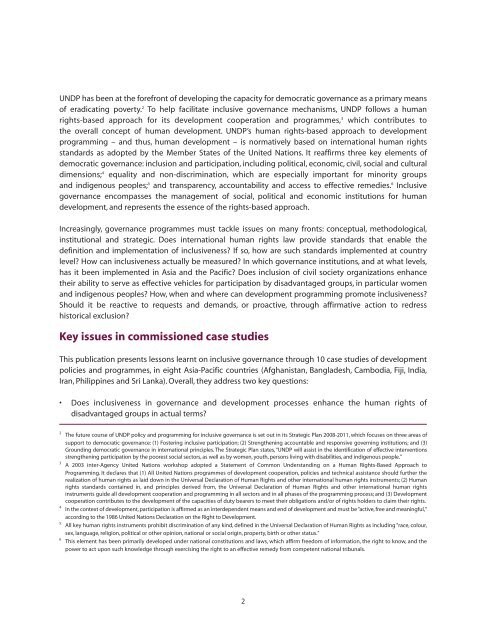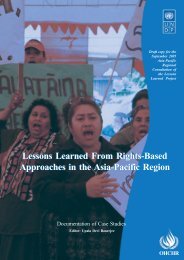View / Download - HRBA Portal
View / Download - HRBA Portal
View / Download - HRBA Portal
Create successful ePaper yourself
Turn your PDF publications into a flip-book with our unique Google optimized e-Paper software.
UNDP has been at the forefront of developing the capacity for democratic governance as a primary meansof eradicating poverty. 2 To help facilitate inclusive governance mechanisms, UNDP follows a humanrights-based approach for its development cooperation and programmes, 3 which contributes tothe overall concept of human development. UNDP’s human rights-based approach to developmentprogramming – and thus, human development – is normatively based on international human rightsstandards as adopted by the Member States of the United Nations. It reaffirms three key elements ofdemocratic governance: inclusion and participation, including political, economic, civil, social and culturaldimensions; 4 equality and non-discrimination, which are especially important for minority groupsand indigenous peoples; 5 and transparency, accountability and access to effective remedies. 6 Inclusivegovernance encompasses the management of social, political and economic institutions for humandevelopment, and represents the essence of the rights-based approach.Increasingly, governance programmes must tackle issues on many fronts: conceptual, methodological,institutional and strategic. Does international human rights law provide standards that enable thedefinition and implementation of inclusiveness? If so, how are such standards implemented at countrylevel? How can inclusiveness actually be measured? In which governance institutions, and at what levels,has it been implemented in Asia and the Pacific? Does inclusion of civil society organizations enhancetheir ability to serve as effective vehicles for participation by disadvantaged groups, in particular womenand indigenous peoples? How, when and where can development programming promote inclusiveness?Should it be reactive to requests and demands, or proactive, through affirmative action to redresshistorical exclusion?Key issues in commissioned case studiesThis publication presents lessons learnt on inclusive governance through 10 case studies of developmentpolicies and programmes, in eight Asia-Pacific countries (Afghanistan, Bangladesh, Cambodia, Fiji, India,Iran, Philippines and Sri Lanka). Overall, they address two key questions:• Does inclusiveness in governance and development processes enhance the human rights ofdisadvantaged groups in actual terms?23456The future course of UNDP policy and programming for inclusive governance is set out in its Strategic Plan 2008-2011, which focuses on three areas ofsupport to democratic governance: (1) Fostering inclusive participation; (2) Strengthening accountable and responsive governing institutions; and (3)Grounding democratic governance in international principles. The Strategic Plan states,“UNDP will assist in the identification of effective interventionsstrengthening participation by the poorest social sectors, as well as by women, youth, persons living with disabilities, and indigenous people.”A 2003 inter-Agency United Nations workshop adopted a Statement of Common Understanding on a Human Rights-Based Approach toProgramming. It declares that (1) All United Nations programmes of development cooperation, policies and technical assistance should further therealization of human rights as laid down in the Universal Declaration of Human Rights and other international human rights instruments; (2) Humanrights standards contained in, and principles derived from, the Universal Declaration of Human Rights and other international human rightsinstruments guide all development cooperation and programming in all sectors and in all phases of the programming process; and (3) Developmentcooperation contributes to the development of the capacities of duty bearers to meet their obligations and/or of rights holders to claim their rights.In the context of development, participation is affirmed as an interdependent means and end of development and must be “active, free and meaningful,”according to the 1986 United Nations Declaration on the Right to Development.All key human rights instruments prohibit discrimination of any kind, defined in the Universal Declaration of Human Rights as including “race, colour,sex, language, religion, political or other opinion, national or social origin, property, birth or other status.”This element has been primarily developed under national constitutions and laws, which affirm freedom of information, the right to know, and thepower to act upon such knowledge through exercising the right to an effective remedy from competent national tribunals.2



